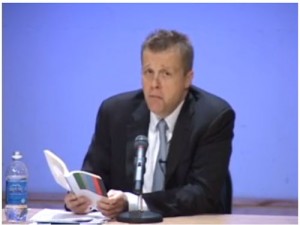Poets: Really, they're the laziest, stupidest people I know.

The following words are from Christian Bök, responding during a Q&A session at Kelly Writers House, UPenn, November 18, 2009:
"I think that my poetics makes it viable for me to excuse a whole variety of obsessive compulsive disorders. It's not Asperger syndrome; it's not a bug, it's a feature. Half the battle of being a poet is trying to transform what would otherwise be dismissed as a weakness into a strength, trying to find ways in which something that should fail under other circumstances finds an ecology within which it can succeed. I think that the more mechanistic and regimented aspects of my work constitute a kind of intellectual crutch used to evaluate the merits of the work upon its completion -- at the very least I know when it's done -- and I can see the outcome of the experiment and be relatively satisfied that it fulfills the constraints of this procedural program, this set of algorithms that I've established in advance. I've put the constraints in place in part to conduct a kind of scientific experiment; I want to be surprised in a relatively rigorous way by the work that I do. I think it's almost impossible to surprise yourself because of course you're supposed to know everything about yourself in advance. But by adopting a series of otherwise programmatic constraints, you create a hypothetical set of controlled conditions under which an experiment can be quite literally conducted and the outcome has the potential to be surprising. In effect, it has the potential to produce information."
"The more delicate components of the work pay attention to craft. I'm probably technically oriented and it seems to me that among the poets that I know, many are very lazy and very dumb. I always joke with my students that poetry couldn't possibly be as hard as they think it is, because if it were as hard as they thought it was, poets wouldn't do it. Really, they're the laziest, stupidest people I know. They became poets in part because they were demoted to that job, right? You should never tell your students to write what they know because, of course, they know nothing: they're poets! If they knew something, they'd be in that disciple actually doing it: they'd be in history or physics or math or business or whatever it is where they could excel. I find this very distressing that the challenge of being a poet in effect to showcase something wondrous or uncanny, if not sublime, about the use of language itself, that we tend to think that because we're conditioned to use language every day as part of a social contract, we should all be incipient poets, when in fact people have actually dedicated years or decades of their lives to this kind of practice in order to become adept at it and I think that craft and technique are part of that. If poetry weren't informed by models of craft then nobody would need take a creative writing course. I joke with my students again that if it was simply a matter of saying, "You known you've written a good poem just because; you'll know it was a good poem when it happens." To me, that's tantamount to telling your students that "You should just use the force, Luke" in order to write a poem. I don't think it's very helpful. But to be able to say "Here's a series of rules of thumb that always work under all circumstances and if you adopt them slavishly, blindly, you can always be assured of writing something, producing something of merit." I think it's important that students are at least reassured that there are some technical aptitudes that they can adopt.
So I think that there's two competing coincident strains to the work: on the one hand, I rely on this kind of regimentation so that I can evaluate the merits of my own work after the fact and I probably rely on a lot of technical rigor just so that I can feel what I do is actually justifiable, that it actually constitutes something of athletic or virtuoso merit."
Kenneth Goldsmith's writing has been called some of the most "exhaustive and beautiful collage work ...
Read Full Biography

